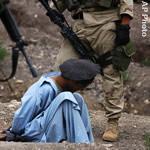2006年VOA标准英语-Pentagon Issues New Rules on Detainees(在线收听)
By Al Pessin
Pentagon
06 September 2006
The U.S. Defense Department has issued new rules for the treatment of detainees and for conduct by interrogators that officials say are designed to ensure humane treatment and prevent the kind of abuses that have happened in recent years. The rules incorporate a part of the Geneva Conventions on the conduct of war that some had argued should not apply to detainees unless they are members of a recognized army.
-------
 US soldiers stand guard by an Afghan prisoner near Zunchorah Village in Khost |
||
"It sets out policy guidance for all DOD [Department of Defense] detention operations that is necessary and appropriate to ensure the safe, secure and humane detention of enemy combatants, both lawful and unlawful, regardless of the nature of the conflict," said Stimson. "The standard of humane treatment articulated in this directive reflects U.S. law and policy, and provides detainees protections that reflect our values as Americans."
The directive says the treatment of all detainees must at least meet the Article Three standard, and that official prisoners of war, from formal armies, are entitled to additional protections. Secretary Stimson listed some of the types of treatment that are prohibited for all detainees, including some prohibitions he says go beyond the Geneva requirements.
"Cruel, inhumane or degrading treatment or punishment, outrages upon personal dignity, in particular humiliating and degrading treatment, murder, torture, corporal punishment, mutilation, taking of hostages, collective punishments, execution without a trial by proper authority, threats or acts of violence, including rape or forced prostitution, assault and thefts, public curiosity [displaying detainees], bodily injury and reprisals," he said.
The new policy requires that detainees be allowed to practice their religion. It also specifies that departures from the policy can not be justified by what it calls "the stress of combat or deep provocation."
The documents issued Wednesday are the result of more than a year of what Stimson called "robust" discussion in the Defense Department and other parts of the U.S. government. He says they incorporate nearly all the recommendations of 12 investigations of detainee abuse claims in the last two years, as well as U.S. Supreme Court rulings that require stricter standards than some officials wanted to set.
At Human Rights Watch, which has frequently criticized the treatment of detainees in U.S. military custody, Jennifer Daskal says the group is "very pleased" with Wednesday's policy documents.
"What's important is that for the first time in a very long time there is a clear policy from on high that will hopefully be communicated down the chain of command that's an important and significant shift from what happened in February of 2002, when administration officials and others suggested that the Geneva Conventions and humane treatment requirements did not apply," she said.
The second document issued Wednesday was a long-awaited update of the U.S. Army's field manual covering interrogation rules. Officials say the manual has the force of law and applies to all U.S. military services. Lieutenant General John Kimmons, the head of army intelligence, says the army is more than doubling the number of interrogators in the field in an effort to increase the amount of actionable information that commanders receive. He says the new manual specifies 19 methods of interrogation that are the only ones allowed, and prohibits many practices that were against the rules before, but were done in some cases anyway.
"Interrogators may not force a detainee to be naked, perform sexual acts or pose in a sexual manner," said General Kimmons. "They can not use hoods or place sacs over a detainee's head or use duct tape over his eyes. They can not beat or electrically shock or burn him, or inflict other forms of physical pain, any form of physical pain."
He also says excessive cold or heat, mock executions and deprivation of food, water and medical care are not allowed. And no dogs may be used in interrogations. The new rules also ban a controversial tactic allegedly used by U.S. interrogators on terror suspects called "waterboarding," a technique that makes people feel they are being drowned.
The general says there was concern that the restrictions might limit the amount of intelligence that would be gathered, but he says he is "very comfortable" with the new rules.
"No good intelligence is going to come from abusive practices," he said. "I think history tells us that. I think the empirical evidence of the last five years, hard years, tell us that.
The two documents issued Wednesday require extensive training of military personnel involved in detention and interrogation, and that detainee operations be a routine part of operational exercises. They also say troops at all levels, including top commanders, will be held responsible for following the rules.
The military has been criticized for only punishing relatively low-level troops in recent abuse cases. In addition, troops are required to report any violations of the rules, even if their commanders endorse the violations. The new rules also cover civilians under contract to the Defense Department, as well as any U.S. government employees, such as CIA operatives, if they work in Defense Department facilities.
Other aspects of the rules that reflect lessons of the scandal at the Abu Ghraib prison in Baghdad and other abuse cases include requirements for surprise inspections by commanders and access for the International Committee of the Red Cross to all facilities and detainees, and prohibitions against military health care workers helping interrogators and military police 'softening up' detainees through mistreatment to prepare them for interrogation.